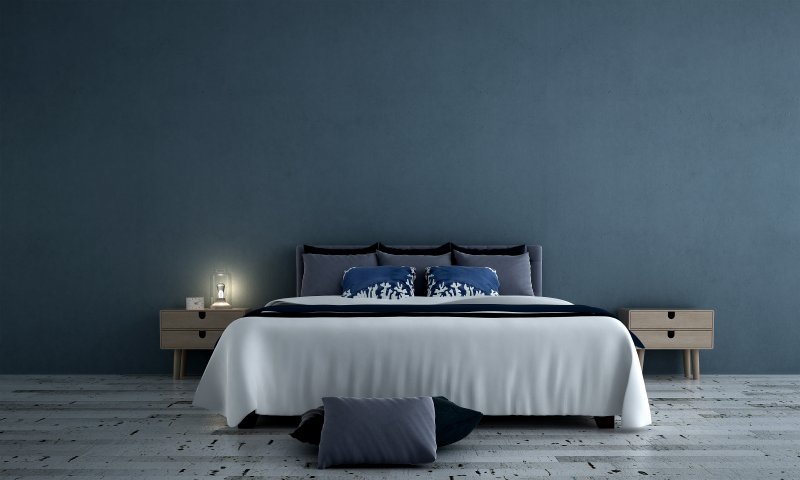
Your bedroom should be the sanctuary of your home, a place where you can retreat after long and stressful days to unwind and recharge. And it’s especially important during these times to have a dedicated place for rest and relaxation. But is your bedroom set up to actually allow for that? Or does your bedroom feel just like any other room in the house?
The problem may simply be that you’ve never paused to consider your bedroom environment before. But not taking into account your bedroom — how it looks, feels, what you keep in it, even how it smells — may be having a bigger impact on your sleep than you think.
There are a few simple things you can do to make your bedroom the place of refuge and relaxation that it should be. Just follow these tips, and we bet you’ll start seeing an improvement in your sleep quality immediately.
Consider color tones
Stick to cool tones when it comes to your bedroom’s color palate. If the colors on the walls are too bright or busy, your brain will have trouble winding down. Color psychology suggests that warmer colors increase heart rate and blood pressure (check out this study on red intensifying reactions) — which definitely doesn’t help promote sleep! On the other hand, cool tones like blues and greens promote relaxation and a calm mind.
Use essential oils
Diffusers that use essential oils can be helpful, especially when using scents that promote sleep. Opt for lavender or neroli to calm you and prepare the mind and body for rest. Avoid using air fresheners that may emit chemicals that can cause irritation in some people.
Avoid mirrors
Feng shui (a system of general rules from ancient China that governs the orientation of a space in order to properly manage energy flow) views mirrors as sources of light and activity, which is why it’s important to leave them out of the bedroom, or at least be able to hide them away during the night. In practical terms, this will prevent them from reflecting sunlight into your eyes in the morning.
Eliminate light
The light that emits from alarm clocks and other electronics can be disturbing when you’re trying to sleep. Try covering your clock or turning it to face away from you.
Use cotton bedding
Particularly in the warmer months, it’s important to choose sheets that promote breathability, as your core body temperature needs to drop in order to fall asleep. Cotton sheets are a good choice if you regularly find yourself waking up sweaty or tossing and turning because you’re too warm.
Comfort is key
Not only should your mattress be comfortable, but your bedding and general atmosphere should be as well. Make sure the mattress and pillow you choose provides optimal neck and back support. Investing in higher quality bedding is always worth it when you consider how much time you spend sleeping!
Lower the temperature
Bedding can only do so much to mitigate the temperature. If your room is too warm, you will be sweating more than sleeping. The ideal temperature should be in the lower to mid-60s, with 68 degrees Fahrenheit being the maximum. If this feels too cool for the fall and upcoming winter where you live, simply pile on the blankets.
Declutter
Clutter can cause anxiety and remind you of all of the chores you have to complete, so it’s best to keep the bedroom as clean as possible.
Keep it quiet
In a perfect world, your bedroom would be completely quiet and clear of all outside or inside ambient noise. Most of us aren’t so lucky! Try using a white noise machine or earplugs to help quiet the space and create a relaxing environment.
Keep activity to a minimum
Your bedroom should be a place ONLY for sleep (or intimate activity). When this is the case, your brain creates an association with the bedroom, meaning it understands that the bedroom is for rest and rest only, helping you get better quality sleep each night. Anything outside of the two activities mentioned above should be kept out of the bedroom – that includes watching TV, checking texts, and working or doing personal activities, like paying bills. Screens can keep you awake, and engaging in mentally taxing activities right before bed can increase anxiety and make it harder for you to fall asleep.
Generally, reading in bed to unwind is ok as long as you’re reading from a true paperback and not an e-reader, which can disturb sleep. However, if you’re finding your reading more entertaining than relaxing, take your book somewhere else, like the couch. Again, your bedroom should be for relaxation and recharge – not entertainment!
When to seek professional help
If you’ve tried out most or all of these tips and still have trouble sleeping, it’s possible you may have a sleep disorder like sleep apnea, which requires a diagnosis so it can be treated. An easy way to get started is to visit a dental sleep medicine practitioner for a screening. Dr. Jeff Rodgers, who has years of experience treating sleep apnea patients, can help with this. He will assess your risk for the disorder and connect you with a sleep physician that will use a sleep test to determine if you do, in fact, have sleep apnea. If you’ve already been diagnosed, Dr. Rodgers can provide you with a custom-made mouthpiece that will help you get the rest you need. To learn more about sleep apnea and how to have it treated, click here to schedule a free consultation.
